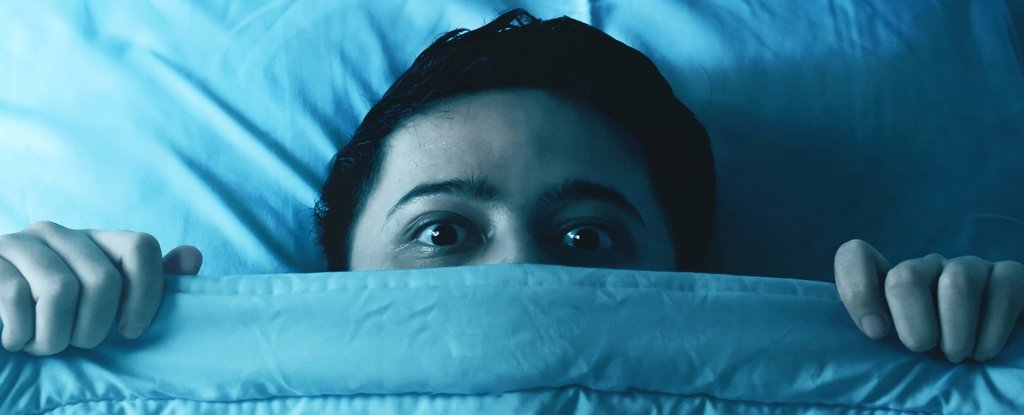Products You May Like
Night is naturally suited for paranormal activity, with less light and sound to limit the imagination.
While the relationship is still murky, new research shows an interesting link between paranormal beliefs and one of the most important night-time activities for we earthly beings: sleep.
In a new study, researchers found subjective measures of poorer sleep quality were associated with stronger beliefs in ghosts and demons, the soul living on after death, an ability for people to communicate with the dead, near-death experiences as evidence of an afterlife, and aliens visiting Earth.
This reduced quality of sleep included lower sleep efficiency, longer sleep latency, shorter sleep duration, and increased insomnia symptoms, the study’s authors report.
In addition to the self-reported measures of sleep quality, the researchers found the belief that aliens have visited Earth is associated with isolated sleep paralysis and exploding head syndrome, a disorder characterized by the sensation of a loud noise or crashing sound inside a person’s skull.
Isolated sleep paralysis – in which a person is aware and alert, yet unable to move, without other symptoms of a sleep disorder like narcolepsy – was also associated with the belief that near-death experiences are evidence for life after death, the study found.
“To the best of our knowledge, this is a novel finding worthy of further examination,” the researchers write.
These findings generally fit with previous studies, they note, which have also found links between paranormal beliefs and sleep variables, especially sleep paralysis. The new study aims to shed more light on this by examining a wider range of sleep variables with a larger sample.
The researchers conducted the study via an online survey, with recruitment publicized through social media and by BBC Science Focus Magazine. They ended up with 8,853 participants, all at least 18 years old, who answered questions about several paranormal topics and sleep variables.
“For all associations, it was found that a higher level of paranormal belief was associated with a poorer subjective sleep quality, even when controlling for age and gender effects,” the study’s authors report.
While the new study may help improve our understanding of the link between paranormal beliefs and sleep variables, as a cross-sectional study it wasn’t designed to answer the obvious follow-up question of why these two things are associated.
The authors do offer some speculation, though. Since sleep paralysis can involve visual and auditory hallucinations, and exploding head syndrome has its namesake sound, the results suggest a belief in aliens may be linked with sleep disturbances featuring sounds or images.
“One explanation for these associations is therefore that someone experiencing sounds or images associated with sleep could interpret this as evidence that aliens or other supernatural beings exist,” they write, although they note more research is still needed to test that.
On the other hand, some of the associations may go the other way, the researchers add, with paranormal beliefs causing anxiety that interferes with sleep. The prospect of paranormal visitors at night could conceivably make it hard to sleep, and not just for children.
That might help explain why a belief in ghosts, demons, or aliens was linked to lower subjective sleep quality, the researchers write, but what about beliefs that don’t involve menacing entities? Is sleep quality also influenced by anxiety about the existence of a soul or an afterlife?
More research will be needed to answer questions like those, they add, including studies that examine additional factors like mental health, education, personality traits, and religious beliefs, due to their associations with both sleep and paranormal beliefs.
While the new study helps illuminate this link, and may fill some gaps in our knowledge about it, it does have a few significant limitations.
Despite the large sample size, for example, participants self-selected to join the study, and are therefore “unlikely to be representative of the general population,” the researchers write.
“For example, the seemingly high rates of [isolated sleep paralysis] and [exploding head syndrome] could indicate that individuals with these symptoms were more likely than others to be interested in taking part in this study,” they explain.
In addition to recruiting more representative samples, the researchers note, future studies on paranormal beliefs and sleep should use objective measures of sleep variables for greater accuracy.
Nonetheless, the authors say their study offers new insights on the link between sleep and paranormal beliefs, and while there’s still a lot we don’t know, it could help to raise awareness of the mere association, both for patients and healthcare providers.
“Reports of paranormal activity or anomalous beliefs could be mistaken as prima facie evidence for more severe disorders,” they write. This study “may encourage clinicians to assess for relevant sleep disturbances and parasomnias in addition to other forms of psychopathology.”
The study was published in the Journal of Sleep Research.
